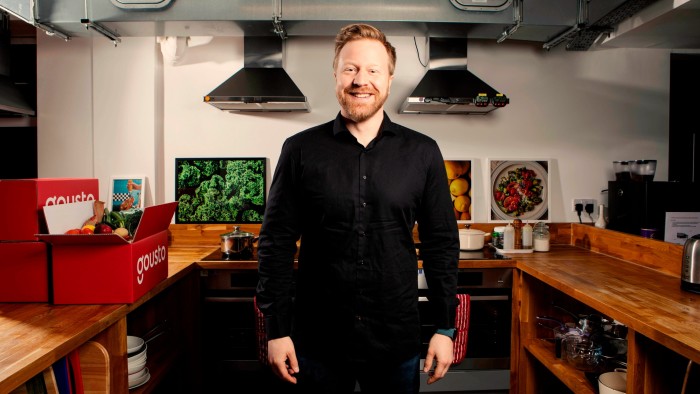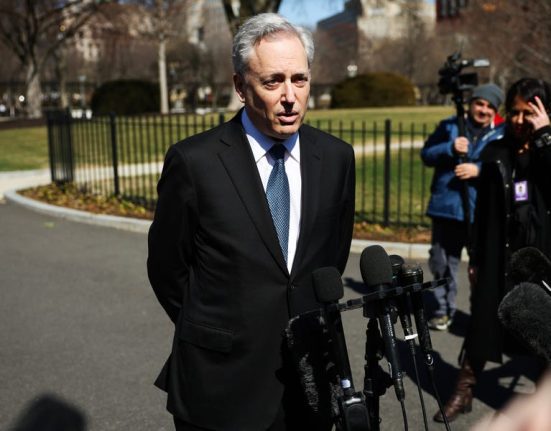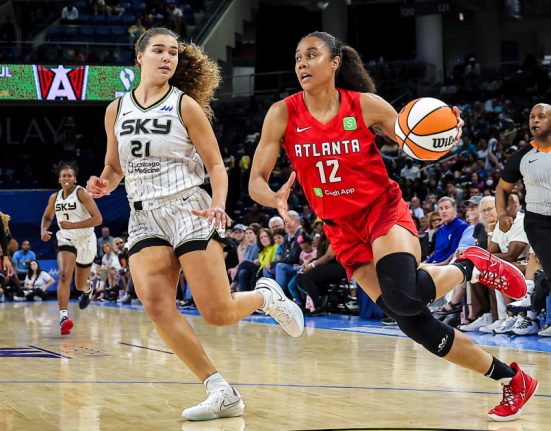At 26, Timo Boldt left his City career to launch Gousto, a meal kit delivery business. It sends customers pre-portioned ingredients and recipes — with up to 200 options available each week. Since founding Gousto in 2012, Boldt, now 40, has pursued a mission to cut food waste and promote cleaner eating.
Increased pandemic demand helped propel Gousto to its first full-year profit of £18.2mn in the 2020 financial year. But as inflation soared and consumer confidence fell, Gusto cut jobs and the valuation dropped from £1.4bn to just £250mn in early 2023. Thanks to the use of AI to personalise meal recommendations and improve operational efficiency, the London-based company returned to pre-tax profitability in the year to December 2023. In 2025, 2mn Britons are expected to eat a Gousto meal.
CV
Born: Berlin, Germany, October 1984
Education: Fichtenberg Oberschule, Berlin. He also graduated from Vintage High School in Napa Valley, California.
European University of Viadrina, Frankfurt, BSc (Hons) International Business Administration.
Executive MBA, University of Cambridge, part-time while building Gousto (2014-16)
Career: Analyst, Rothschild, London (2008-10)
Vice-president, Petrus Advisers, special situations hedge fund, London (2010-12)
Founded Gousto, developed 100 recipes (2012)
Opened headquarters in Shepherd’s Bush, London (2018)
Lives: London
What inspired you to start Gousto?
When I was about 16 I moved to the US for a year and stayed with a student exchange family, living near my godparents. My godmother has built many food businesses: ice cream shops, a vineyard, an organic supermarket — but they never had a board, never raised money, so they were fairly basic. I always looked up to them and aspired to be what they represented: a lot of freedom, flexibility, a lot of purpose.
I had not known a single entrepreneur growing up in Berlin. So this gave a perspective that massively shaped me. I went into finance thinking that one day I would pursue what [my godparents] had pursued.
Why did you go into banking?
I liked numbers and was kind of geeky at university. I founded an investment club for students. We got very lucky because we bought Chinese stocks in 2007 when the market went up and we took a lot of risk buying penny stocks. Then we got huge returns and sold before the market crashed, because we graduated. It was pure luck on the way in, pure luck on the way out, but we looked like geniuses.
My professor said: “You should apply to banking.” I applied, got an internship, then somebody said: “Look, there’s a job in London, do you want it?” I had never been to London. So I went into banking.
Why did you give it up?
I gained a really good financial toolbox and met friends for life in banking. But I didn’t really see the purpose. The sole focus was money. I wanted to pursue my passion for food and cooking and something that has positive purpose. So that kind of morphed into the Gousto idea in 2012. It felt daunting to quit finance.
I moved back into student accommodation in Oxford, where my girlfriend — and now wife — was studying for a PhD. I went from a very high salary in a hedge fund to no salary, but I had great motivation. I thought, if this fails, I can always get a job again somehow.
How has your approach to money changed since university?
My philosophy of money has been shaped by my siblings. My sister has been on medication all her life for psychological problems, and has never been employed. My younger brother was diagnosed with multiple sclerosis at age 13. As a family, it was very sad back then and very difficult for my parents, especially since I was young and naive and probably didn’t pay that much attention. I think it drove my thinking that health is wealth.
My approach to investing is shaped by the insight that the utility value of money will decline over time. If I spend £1,000 today on skiing, that’s amazing, I’m creating memory dividends. If I go skiing at 80, that’s probably pointless. It’s not going to be fun.
What would be a successful 24 hours for you?
Am I being the best chief executive, best friend, best family member I can be? Am I the healthiest, fittest I can be? Am I being an athlete? These areas are in my pie chart of goals. They’re very influential in my life.
Society teaches you to equate success with financial success. But being really clear on what matters to you and then defining success accordingly is a massive “unblock” in how you invest your time.
Where does your motivation for Gousto come from?
My siblings cannot do what I do. I can, therefore I should. I had this massive amount of motivation from that to work hard and succeed in life. Then I also had this health vision. In the UK, 58 per cent of adults’ daily calorie intake is ultra-processed food [according to Gousto, 11 per cent of ingredients used in its recipes are UPFs]. Every study points towards that decreasing your life expectancy.
What stops people from eating well?
Money and convenience. The cost of living crisis was pretty painful for the UK. I think structurally we are in decline as a country. I don’t see that stopping anytime soon, if you look at the maths. So we’re trying really hard to be affordable and accessible to as many families across the UK and be mass market. We don’t want to be a London proposition.
What do you invest in?
I have a small amount of money in diversified ETFs long term. I love the UK, but I also think we have got to take advantage of generative AI and these trends, so my ETFs have a massive bias towards technology. But I don’t check them. They’re aimed for the next 40 years. I definitely believe in the power of compounding.
I think if I were the government, I would give every baby £12,000 because if that compounds at 7 per cent until they are 65, they will have £1mn for health and retirement. And we have 600,000 babies born in the UK every year. So that would cost us £7bn. We’re currently spending £80bn on [state] pensions. So with £7bn investment you could get rid of £80bn cost.
What are the best and worst investments you’ve made?
One of the best investments I made was a Cambridge MBA. I paid myself zero salary for a long time and then, as soon as I started paying a salary, I used it to pay for the MBA. Luckily, I got a scholarship on the side so did not pay full price. That was a really difficult decision back then, because I did not have any money.
Worst investment? I had a period where I played with call options. I worked in a hedge fund and the market went up and I won twice and then lost everything the third time. It was a really important lesson because you get cocky very fast. I also invested in start-ups that failed, but I am grateful for the reflection and learning that brought.
Do you have a pension and a retirement plan?
I have a small amount of ETFs, but Gousto is kind of the pension. My dream is to work until I’m 95. I hate the idea of not working. I love work.
If you inherited £1mn what would you do with it?
I would take my wider family and friends on the best trip ever and create memory dividends I’ll benefit from for the rest of my life. And then I would give to charity.







